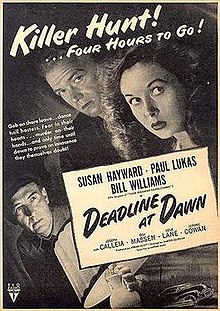Deadline at Dawn
| Deadline at Dawn | |
|---|---|

Theatrical release poster
|
|
| Directed by | Harold Clurman |
| Produced by | Adrian Scott |
| Screenplay by | Clifford Odets |
| Based on |
Deadline at Dawn 1944 novel by Cornell Woolrich |
| Starring |
Susan Hayward Paul Lukas Bill Williams |
| Music by |
Hanns Eisler C. Bakaleinikoff |
| Cinematography | Nicholas Musuraca |
| Edited by | Roland Gross |
| Distributed by | RKO Pictures |
|
Release date
|
|
|
Running time
|
83 minutes |
| Country | United States |
| Language | English |
Deadline at Dawn is a 1946 film noir, the only film directed by stage director Harold Clurman. It was written by Clifford Odets and based on a novella by Cornell Woolrich (as William Irish). The RKO Pictures film release was the only cinematic collaboration between Clurman and his former Group Theatre associate, screenwriter Odets. The director of photography was RKO regular Nicholas Musuraca. The musical score was by German refugee composer Hanns Eisler.
U.S. Navy sailor Alex Winkley (Bill Williams) wakes up from a night of drinking in New York City and finds he has a wad of cash. His memory is hazy, but he knows he got it from a woman he had visited earlier in the evening, Edna Bartelli (Lola Lane).
With the help of dance-hall girl June Goth (Susan Hayward), he attempts to return the money, only to find out that the woman is dead. The sailor is not sure if he is the killer or not. Alex and June, along with a philosophical cabbie (Paul Lukas), stay up all night, attempting to solve the murder mystery before the sailor has to catch a bus to the naval base in Norfolk, Virginia, in the morning. Their deadline is at dawn.
During the film, the many false leads and red herrings involve a blind piano player named Sleepy Parsons (Marvin Miller) and a young couple. Bartelli had been in the business of blackmailing men with whom she had had affairs, so many suspects are possible. The woman's brother Val (Joseph Calleia) adds a touch of menace to the plot. The surprise ending resolves all issues, including the relationship between Alex and June.
Richard Fleischer says that Sig Rogell, head of RKO's B Picture unit, bullied Harold Clurman during production meetings, saying he would "kick the director right in the balls". He says Clurman accepted it without complaint.
...
Wikipedia
